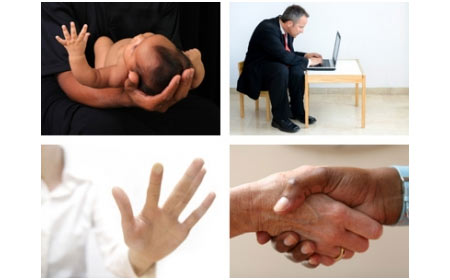A new study conducted by experts at MIT Sloan School of Management highlights that heavy jobs make job candidates more essential, whereas rough candidates make social interactions look more difficult and hard objects increase stringency in negotiations. Experts tested three dimensions of touch namely weight, texture and hardness unknowingly influence judgments and decisions associated with varying events, situations and objects. Findings may be applicable to those who desire to make more informed decisions.
Experts conducted a series of six experiments and revealed that basic tactile sensations influence higher social cognitive processing in both dimensions specific and metaphor-specific. They observed that shoppers understood and developed confident impressions of products with which they physically interacted. Other experiments revealed that passersby examined job candidate by viewing resumes under light or heavier clipboards. Participants that used heavier clipboards rated the candidate better overall.
Joshua Ackerman, an assistant professor of marketing at MIT Sloan mentioned, “What we touch unconsciously influences how we think. In situations where evaluations and decisions really matter, we need to pay attention to our physical surroundings and, in particular, how we engage these surroundings through our sense of touch.â€
The candidate was not rated as more likely to get along with coworkers. This suggested that the weight cue hampered impressions of the candidate’s performance and seriousness. Participants using heavier clipboards rated their own accuracy on the task as compared to those who used lighter clipboards. While summing up a potential employee participant who sat on hard chairs were seemingly more stable than those sitting on soft chairs.
Experts share that sensory experiences in the initial stages of life influence the progress of our conceptual knowledge. This conceptual knowledge can consequently be applied to new experiences. Therefore touching objects may gradually prompt the processing of physical sensation and touch related conceptual processing.
Ackerman quotes, “I find it amazing that subtle actions like touching sandpaper or sitting in a hard chair can have such an influence over very important decisions, such as which candidate we’re willing to hire, how generous we are, and how much we’re willing to pay for big ticket purchases. Our hands, we’ve learned, manipulate our minds as well as our environments. Perhaps the use of such ‘tactile tactics’ will represent the next advance in social influence and communication.â€
Metaphors such as ‘having a rough day’, ‘coarse language’, ‘thinking about weighty matters’ and ‘gravity of the situation’ highlight that heaviness develops impressions of importance and seriousness, whereas roughness leads to impressions of decreased coordination. Touch is known to be both the first to develop and a critical means of information acquisition and environmental manipulation. Experts share that it remains perhaps the least appreciated sense in behavioral study.

